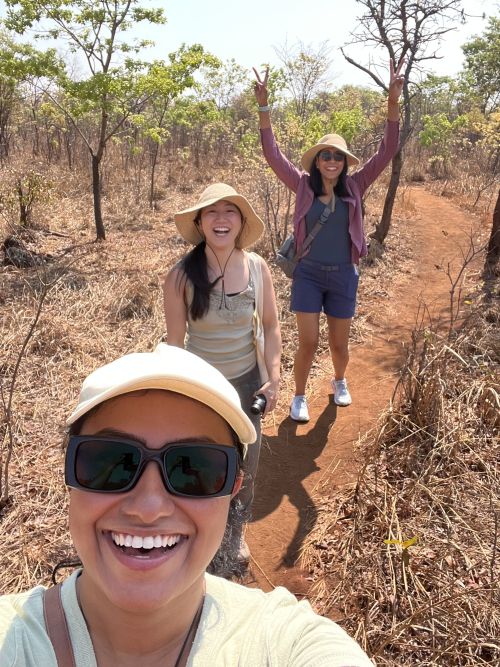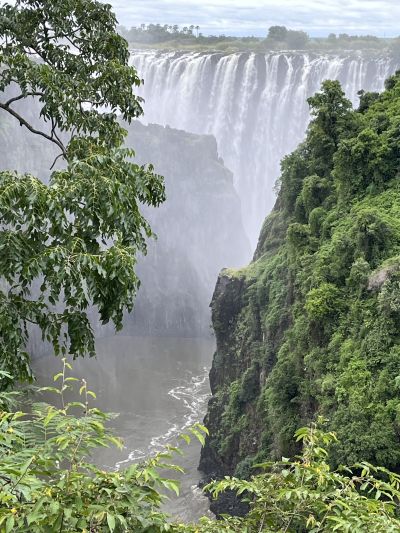Samhita Nanduri

I am spending my EDGE year at the University Teaching Hospital (UTH) in Lusaka, Zambia. UTH is Zambia’s largest government and referral hospital and receives patients from all over the country and neighboring countries. It has Zambia’s only formal neurological service and residency training program, which has since helped fill the gap of zero neurologists for 18 million Zambians before 2018. I have worked closely with my colleagues, who are Zambian neurologists and researchers, as well as visiting residents and faculty from around the world.

When I first arrived, I joined a small team of physicians and researchers who designed, protocolized and opened Zambia’s first stroke unit. Stroke is the top cause of adult-onset disability and third overall cause of death in Zambia. My role includes creating patient education materials, helping to run nurse trainings, meeting with nursing leadership, keeping track of resources and rounding on the stroke unit. I currently work alongside chief residents and neurologist attendings as the sole medical student and am encouraged to share my perspectives on running our unit. I found my prior master's in global medicine training facilitated my learning in creating and sustaining a hospital ward in a resource-limited setting.
As a part of my close work with the stroke unit, I have balanced my time between research and clinical work. I regularly round on neurology and infectious disease wards, and I have followed patients who have had everything from tuberculous meningitis to neurosyphilis to strokes in the setting of HIV complications. In the afternoons, I attend lectures, journal clubs and grand rounds.

I am also working on several research projects. I came to Lusaka with a project to assess sex-specific differences in post-stroke mortality as a study of the patient-caregiver relationship in at-home care. In the same vein, I am completing a manuscript assessing prior data UTH collected on patient and caregiver perspectives of symptoms and perceived anxieties experienced at home. I am also working on a project assessing the risk of stroke after starting antiretroviral therapies for people with HIV, as well as a few projects on implementation science as related to the planning and execution of our stroke unit.

But perhaps what I am most proud of this year is a project I am leading on stroke education in the unit. We adapted stroke education materials from the American Heart Association/American Stroke Association in a visual-heavy, text-minimal way to meet the language barriers, health literacy and general literacy levels of our patients. We have packets at discharge and at bedside for nurse-directed trainings and self-learning. I also led efforts to create videos with scripts translated in English, Nyanja and Bemba, local languages spoken in Lusaka. We have goals of translating this material into Lozi and Tonga. This research assesses which methods of patient education are most efficacious for learning. I am studying preconceived notions, stigma and cultural impact on patient perceptions of stroke, as well as stroke knowledge and how these ideas may change after exposure to education. Patient and caregiver education also alerts them to at-home stroke recovery, caregiver burdens, and mental and physical changes. Ultimately, this material aims to promote patient autonomy so that they are able to participate in patient care as informed team members, a dynamic that is not culturally expected but key to reducing morbidity and mortality outside the hospital.

This year abroad has been a master class in global neurology and neuroinfectious disease, and I am grateful for the warm and supportive team at UTH Neurology that has encouraged my leadership and learning. I return to my final year of medical school with a clear goal to work in global academic neurology, strong relationships with my mentors and colleagues, a deep appreciation for bridging gaps in resource-limited settings, exposure to a breadth of neurological cases and a stronger background in research. Though I placed as an alternate for Fulbright, I decided to go to Lusaka anyway because I knew that what I would experience here would be entirely unique and immeasurable. I am grateful to Drexel for approving of this year; it is, by far, the best thing I have done for my medical learning yet.

Back to Top